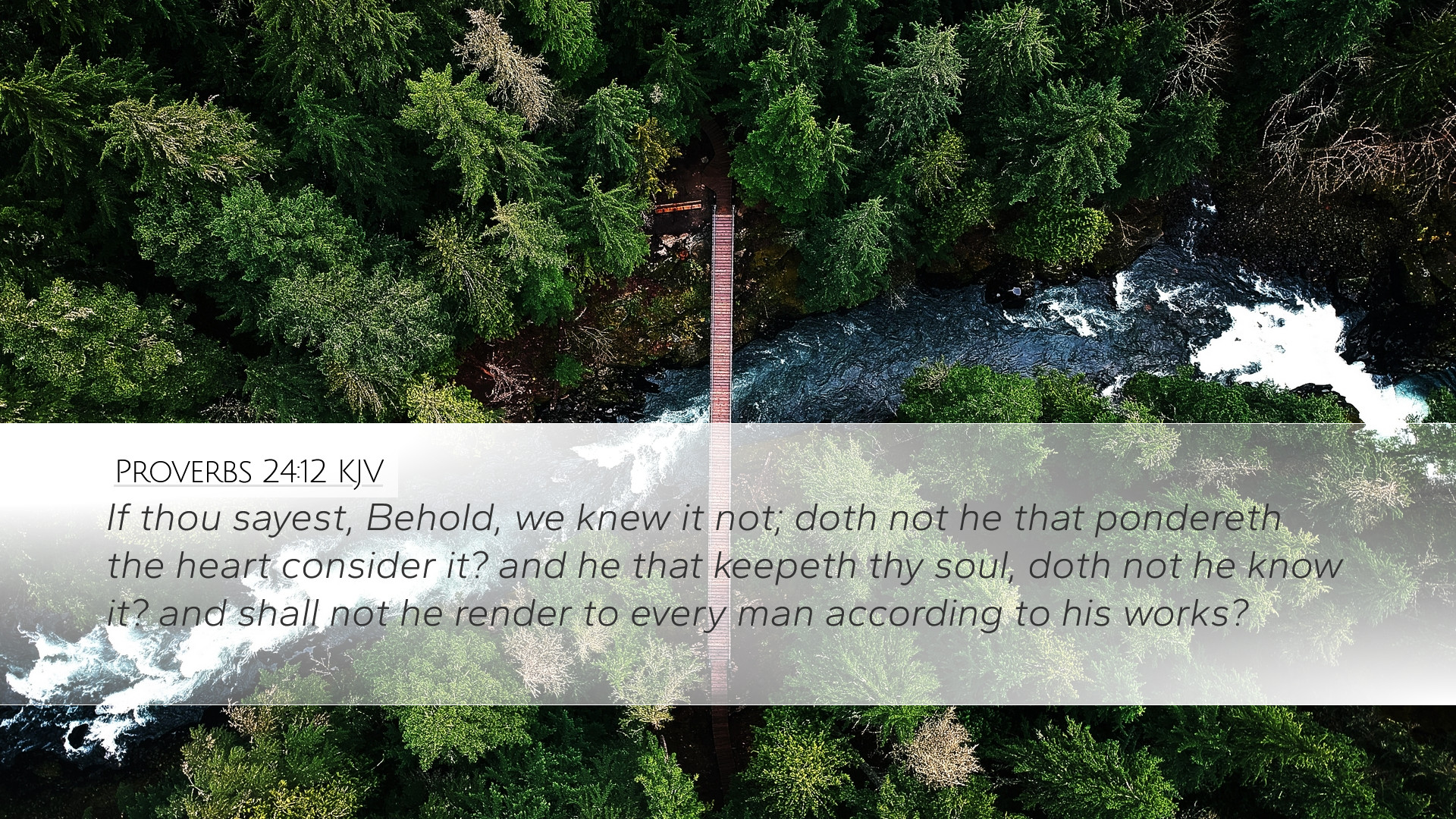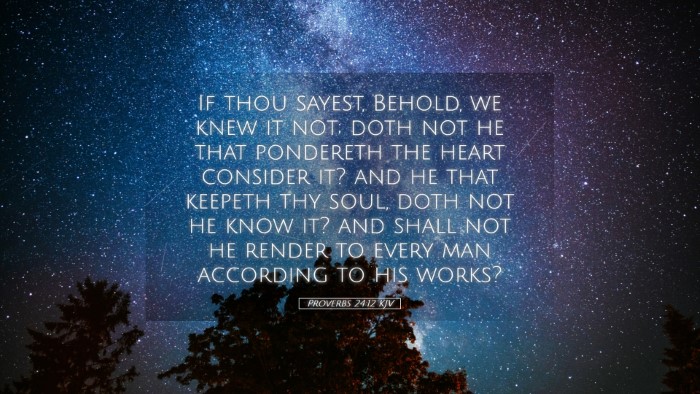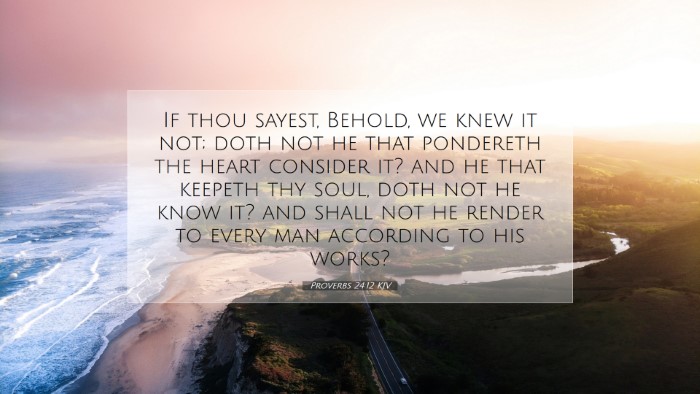Commentary on Proverbs 24:12
Verse (KJV): "If thou sayest, Behold, we knew it not; doth not he that pondereth the heart consider it? and he that keepeth thy soul, doth he not know it? and shall not he render to every man according to his works?"
Overview
Proverbs 24:12 addresses the theme of accountability and divine observation, emphasizing that God sees our actions and knows our hearts. This verse builds upon the wisdom of recognizing moral responsibilities and the consequences of one’s actions. Various public domain commentaries provide us with profound insights relevant to both personal and communal life.
Insights from Matthew Henry
According to Matthew Henry, this verse serves as a reminder against complacency and ignorance regarding moral and ethical duties. Henry emphasizes that the phrase "we knew it not" reveals a common excuse among individuals when confronted with their failures to act in accordance with righteousness.
- Moral Accountability: The idea that ignorance is not an acceptable defense before God is central in Henry's analysis. He argues that God is intimately acquainted with the inner workings of our souls and delivers justice based on our actions.
- Diligence in Observance: Henry urges readers to be vigilant in their duties, asserting that while humans may overlook certain responsibilities, God does not. It is imperative for believers to maintain awareness of their obligations to others and God.
- Judgment According to Works: The final clause of the verse points to the reality that every man will be judged according to his deeds, reinforcing the notion of divine retribution in light of one's moral choices.
Insights from Albert Barnes
Albert Barnes highlights the rhetorical nature of the verse, where the questions posed serve to convict the reader of their moral responsibilities. Barnes interprets God as the ultimate judge who examines the hearts of men, ensuring that they are accountable for their ignorance.
- Divine Omniscience: Barnes stresses that God is all-knowing, and no pretense of ignorance can shield us from His scrutiny. He reminds us that the intent and motivations behind our actions hold weight in the eyes of God.
- Repercussions of Negligence: The commentary discusses that negligence in moral duties could result in severe consequences. Barnes emphasizes the importance of active participation in righteousness rather than passive ignorance.
- Encouragement for Active Duty: This verse encourages believers to take initiative in ethical conduct and social justice rather than waiting for circumstances to dictate their responses.
Insights from Adam Clarke
Adam Clarke provides a thorough exegesis of the moral implications embedded in this verse. He notes that the very fact that God "ponders the heart" signifies a profound understanding of human nature, often overlooked by the individual.
- Self-Examination: Clarke advocates for self-reflection among believers. Recognizing our shortcomings and being honest about our knowledge and duties is essential for true repentance and transformation.
- Spiritual Awareness: The commentary emphasizes the necessity for spiritual alertness, urging Christians not to hide behind the veil of ignorance. Clarke suggests that awareness of God’s omnipresence can lead to a more conscientious living.
- Hope in Justice: Clarke reassures believers that God’s justice is perfect, compensating each individual according to their works, thus advocating hope for those who strive to live righteously despite societal neglect of moral duties.
Theological Implications
The verse encapsulates key theological principles concerning sin, accountability, and the nature of God as just Judge. The reflections from these commentaries elucidate how awareness of divine observation should inspire a life of integrity and ethical conduct among believers.
- God’s Nature: Each commentary agrees on God’s omniscience and justice, reinforcing the understanding that He does not overlook any wrongdoing.
- Human Responsibility: Believers are reminded of their duty to act justly and compassionately, with knowledge that God expects diligence in moral conduct.
- Create a Culture of Accountability: The verse encourages a communal approach where individuals hold one another accountable in their spiritual and ethical pursuits, fostering an environment where ignorance is replaced with knowledge and responsibility.
Practical Applications
In concluding this analysis, it is crucial for pastors, students, theologians, and scholars to translate the insights from Proverbs 24:12 into practical actions within their communities and personal lives.
- Encourage Open Dialogues: Promote discussions around moral responsibilities and ethical challenges faced in everyday life, emphasizing the importance of recognizing and addressing them.
- Foster Accountability Groups: Establish small groups wherein members can support one another in carrying out their spiritual and communal responsibilities.
- Educate on Divine Justice: Offer teachings on God’s justice, highlighting the importance of active moral engagement and the awareness that God sees all actions and intentions.
Conclusion
Proverbs 24:12 serves as a potent reminder about moral accountability. Through the insights gleaned from revered commentators, we ascertain the vital need for discernment and action in the face of ethical dilemmas. It calls each believer to be reflective of their duties, aware of God’s all-seeing eye, and active in doing good works, assuring themselves of God’s righteous judgment.


